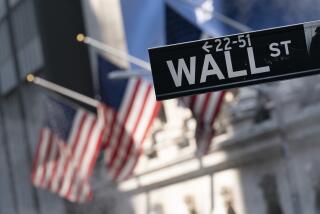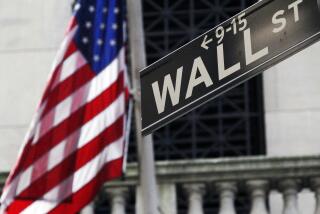January Effect Could Be a Month Late This Year : Stocks: The UCI professor who co-authored a book about the stocks of small companies outstripping the blue chips at year’s start blames the Persian Gulf crisis.
- Share via
IRVINE — The stock market’s January effect may become a February effect this year.
So says UC Irvine finance professor Robert Haugen, co-author of “The Incredible January Effect,” a book which details the tendency of small companies’ stocks to outperform blue-chip stocks at the beginning of each year.
But so far, the January effect has not been terribly effective. All the major stock indexes have fallen in the first two trading days of January, even the broad-based Standard & Poor’s 500 and the smaller stock-oriented American Stock Exchange.
The reason? Blame it on Saddam Hussein.
Haugen said that money managers whose start-of-the-year aggressiveness makes the January effect work are likely to be holding back now because of the mid-month deadline for Iraq to pull out of Kuwait.
But don’t worry, investors--be happy. February could be your month.
Haugen, a corporate finance and investments specialist, said Thursday that once the Iraq situation becomes clearer, the investment climate will improve. Also, if the current recession is a mild one, as many economists believe, then the market has just about hit bottom--meaning that savvy investors are likely to stop selling and start buying soon.
And all that is good news for public companies in Orange County because most are the low-priced, volatile stocks that benefit most from the January effect, Haugen says.
“The kind of company whose stock responds well to the effect is a high-risk company with a small market capitalization, no dividend, a high debt-to-equity ratio, a small price per share and poor stock-price performance over the past five years,” he pointed out.
“Those are negatives to most investors, but to money managers who go after value relative to growth--and that is most money managers--those actually are attractive signs” as long as the company doesn’t have serious management or marketplace problems, he explained.
In their 1988 book, Haugen and Joseph Lakoniskok, a professor of finance at the University of Illinois, theorized on the cause of the January effect. They found that professional money managers, who are judged by their ability to annually increase the value of the portfolios they handle, take their most aggressive investment positions at the start of a year. This gives them as much time as possible to adjust their strategies by the end of the year.
As the year progresses, managers who meet their goal--which generally is to equal the performance of the Standard and Poor’s 500 index--tend to lock in their gains by liquidating their holdings in speculative, small-company stocks and moving the profit into conservative blue-chip stocks for the rest of the year, Haugen explained.
His studies of market movement show that money managers’ sell-off of small company stocks begins in earnest in September and lasts through December, stretching sales over a long enough period so that while stock prices are depressed, they aren’t driven through the floor.
“But because they all re-enter the market almost simultaneously in the first few weeks of January, it develops quite a lot of (upward) price pressure on the smaller, riskier companies’ stocks,” Haugen said, “and that causes them to perform very well relative to larger companies’ stocks.”
The phenomenon, he said, “has been going on since the 19th Century and is not just something that happens here. It is worldwide.”
Haugen compares movement of the broad-based S&P; 500 and the small stock-oriented Amex to gauge the January effect. In the first two trading days of 1991, both indexes have lost value, but the Amex composite has dropped by only 1.08% while the S&P; 500 has lost 2.52%.
The January effect, Haugen cautions, doesn’t mean that timely investments in small stocks will be profitable, just that the small stocks will fare better than the big-company stocks, whichever direction the market heads.
Haugen said he believes that the effect will be much slower to show up this year because most investors, including the professional money managers, are waiting for the Middle East situation to be resolved before plunging into the market.
“And if things look more and more bleak as we move toward the 15th,” Haugen said, “then I would not expect stocks to go up.”
But whether the market moves up or down, there was a tremendous volatility immediately after the Iraqi invasion of Kuwait in August, Haugen said, and that probably gave most money managers “increased incentive to play their cards closer to the vest” and liquidate their small-company holdings.
“So now, we have a potential for a bigger January re-entry boom than is normal,” he said. “Still, there might be a tendency to delay that re-entry until after the Jan. 15 deadline, so we might have a February effect instead.”
More to Read
Inside the business of entertainment
The Wide Shot brings you news, analysis and insights on everything from streaming wars to production — and what it all means for the future.
You may occasionally receive promotional content from the Los Angeles Times.










